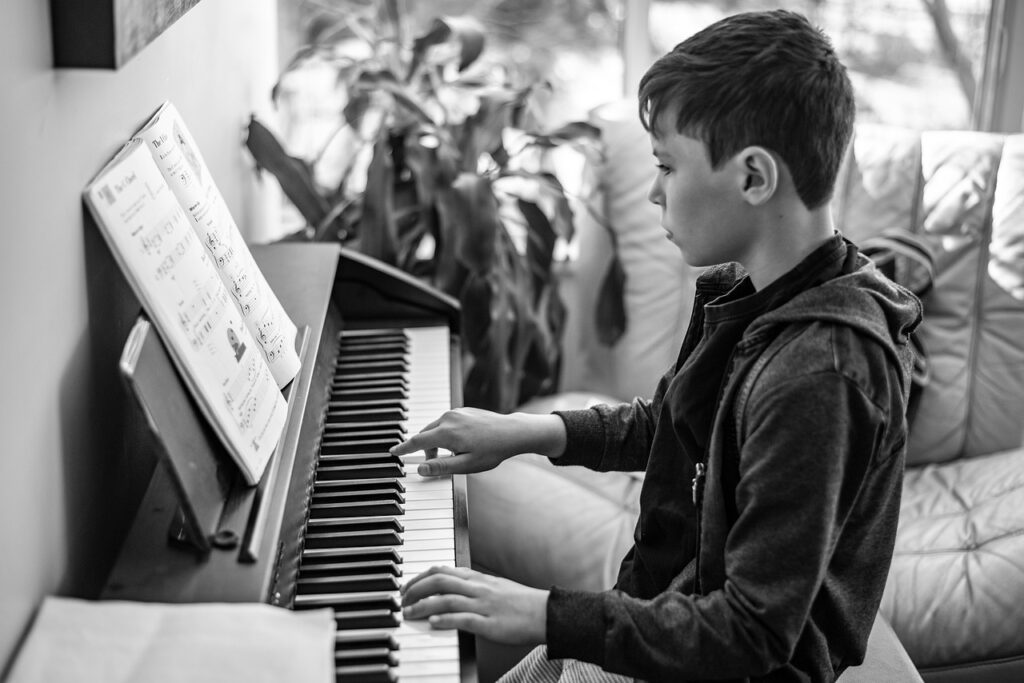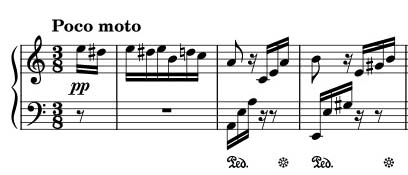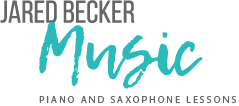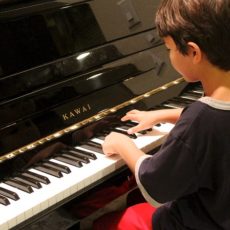
As a beginner piano student practicing can be a daunting task. You are taking in so much information at once in your lessons, that applying it at home can seem challenging. These 10 best piano practice tips for beginners will help set you on track to develop a consistent and enjoyable practice routine, so that you can get the most out of your practice.
1. Clean Environment (free of devices)
When you are entering the practice room, you want to make sure that the space is clean and inviting. Having a practice space that is devoid of clutter suddenly makes the idea of spending time in that room and practicing a lot more appealing! Make sure that the top of your piano is cleared of books and sheet music. Leave your phone or laptop outside of the practice room when playing, so as to avoid distractions.
If you are using technology in your practice such as a metronome or a transcription program like Audacity, ensure that that your internet is turned off and that your phone is on airplane mode.
2. Have a Practice Intention
Often when we are first learning how to practice, we can mistake ‘practicing’ for just ‘playing’. Remember, when you are practicing properly: you are working on specific things within the music and the weaknesses in your playing. Setting a practice intention will ultimately help you to improve a lot quicker. So, before you begin practicing, it can be helpful to write some clear intentions for your practice session. The more specific the intention, the better. For example, an intention for your daily practice could look something like this:
C major scale: practice two hands while saying the finger numbers out loud. Aim to play the whole scale, both hands together, at crotchet = 120.
3. Slow and Steady
This is one of the most important pieces of advice I could give to any beginner piano player. Go slowly! Sometimes when we are learning a song, we can begin to get excited and want to rush through and play it as fast as possible! However because you are just beginning to play, it is critical in this period that we try to practice slowly and consistently.
Because your fingers and brain are learning scales and pieces for the first time, there is a lot of information to take in. This means it can be very challenging to play everything fast while still maintaining a consistent speed throughout your practice.
Using a metronome is ideal for helping you to practice slowly and lock into a steady tempo. If you find the metronome distracting, you can practice counting out loud while playing to begin to develop your time.
4. Chunking and Repetition
When practicing a song, it can be easy to fall into the trap of just playing from the beginning of the piece until we encounter a problem, and then going back to the start. This type of practice is very inefficient, as you aren’t directly targeting the tricky spot. The best type of practice is when you can be reflective and honest about the parts of the music that you don’t know and tackle those small sections.
This type of technique is a term I like to call chunking. For example, say you are playing ‘Fur Elise’ and when you get to the 3rd bar you can’t quite get your right hand to play the note C in time. Chunking that section would involve practicing moving your thumb on A to your thumb on C with metronome, and repeating this over and over again. Once you have done this several times, you should go back to the start and play from the beginning of the piece. You will then notice that your hand now moves to the position you want it to and you can play the piece without any stops.

5. Practice Consistently (20 minutes a day)
When beginner students ask me a question like ‘how much should I practice?’, I always tell them to practice an amount of time that you can keep up consistently each day. One of the most important piano practice tips for beginners is to make sure we are going for ‘quality’ over ‘quantity’.
I would much rather a student conduct 20 minutes of focused practice everyday than a student who does 2 hours the day before their lesson. Your brain needs to time to process all of the complicated new things you are learning in your lessons. The best way to do that is by regularly coming back to the piano and working on the same stuff over a period of weeks and months.
Practicing every day also allows you to build up momentum with your playing, where you will gradually begin to improve a little bit each day. This will be sure to build your confidence, as you prove to yourself you are serious about piano whilst also speeding up your progress.
6. Use Your Voice
While not all beginner pianists want to sing and play at the same time, using your voice while learning is a tool not to be underestimated. When learning to read music, saying or singing the notes out loud while playing them can help to focus on what you are playing. I have noticed that when my students say the notes out loud that they are playing, they seem to internalise what they are learning more efficiently.
If you are learning about different note values and how long to hold them for, counting out loud can help you to understand how long to hold notes such as crotchets and minimums.
7. Counting and Clapping
Often my beginner piano students find it challenging to play the correct rhythms notated on their pieces and stay in time. Because they are trying hard to focus on playing the right notes, use the right finger numbers and play with good technique; playing in time can be pushed to the side and disregarded. If there is a note value that is uneven or that they haven’t seen before (ie. a dotted crotchet) it is common for them to just simply guess how long the note is supposed to be held for.
Clapping and counting the rhythm out loud allows you to focus on the rhythm, without having to think about playing anything. Alternatively, for some of my students who find counting out loud challenging we use The Kodaly Method: a system for teaching that involves verbalising the rhythms as different sounds. Links to videos describing these two techniques can be found at the bottom of the article.
8. Piano Practice Diary for Beginners
Earlier in this article I talked about the importance of having a practice intention. But what are you going to record your practice intention in? A practice diary, of course!
Practice diaries are super useful for beginner piano players because it allows them to keep track of everything they have been learning. You can write down:
- The speeds that you have been playing your scales.
- What specific bars in your pieces you have been targeting.
- The kind of recordings or renditions you have been listening to of your chosen pieces.
Keeping track of what you have been practicing helps you to know what you are going to practice in your next session, so you can pick up right where you left off. It is also a documentation of your learning.
If you keep up this process, you can refer to old practice diaries in the years to come; if you ever want to revisit something you were working on – or just to reflect on how much you have improved.
9. Practice and Listening Away from the Piano
We live in a time where learning doesn’t directly need to come from a teacher or a music book. The internet provides us with unlimited access to any sort of music-related knowledge we could ever desire such as YouTube videos, apps and programs that we can use to help enhance our musicianship.
As a budding pianist, use these tools to your advantage.
- https://www.musictheory.net/ provides you with tools to improve your understanding of notes, chords, intervals and key signatures.
- www.therhythmtrainer.com will help you to recognise and hear different rhythms.
Doing this sort of practice can be refreshing as it doesn’t involve playing the piano yet and still works on developing your musicianship. Listening to music in your spare time can also be considered practice. Listening to recordings of the songs you are learning can inspire you to practice, whilst also informing you of what stylistics choices other performers have made when playing the same pieces as you.
10. Record Yourself and Listen to it
I have already mentioned the importance of ‘self reflection’ in musical practice. Recording yourself practicing and listening to it is the easiest and most honest form of reflection. Sometimes when we are playing it can be easy to get caught up in the music, ignoring mistakes we are making or playing out of time.
Recording yourself allows you to listen back to your playing without being distracted and reflect on what you are hearing. With modern day technology, everyone can easily use their phones to get a decent recording of themselves. Some students can find recording themselves scary or disheartening. But it’s important not to judge yourself and your playing, even if you are watching the recording from a critical perspective.
You can use these recordings to look back on your playing in the future to see how far you have come, or even send them to your teachers or friends!
Summary of Best Piano Practice Tips for Beginners
Well, there you have it – my 10 best piano practice tips for beginners. My advice to you now would be to pick one of these tips and try to implement into your practice. Overtime, you can begin to include all of these into your practice and become the best piano player you can be!


